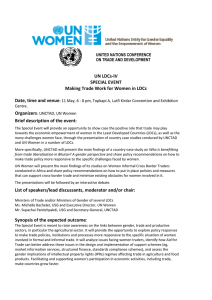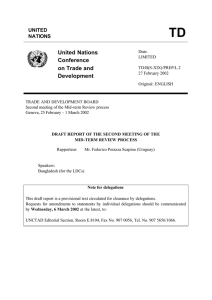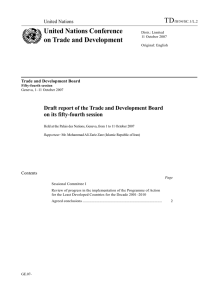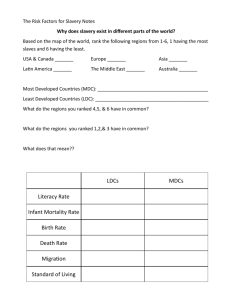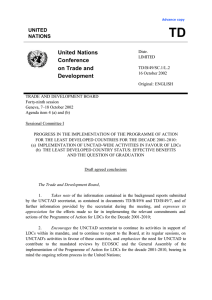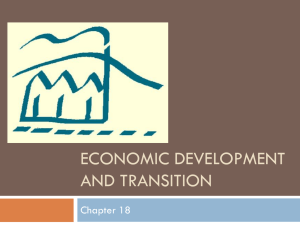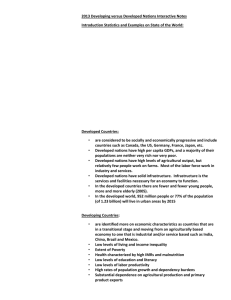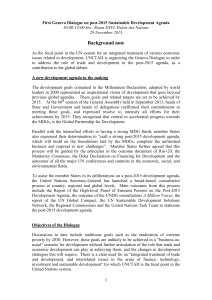ldc s africa N°1
advertisement
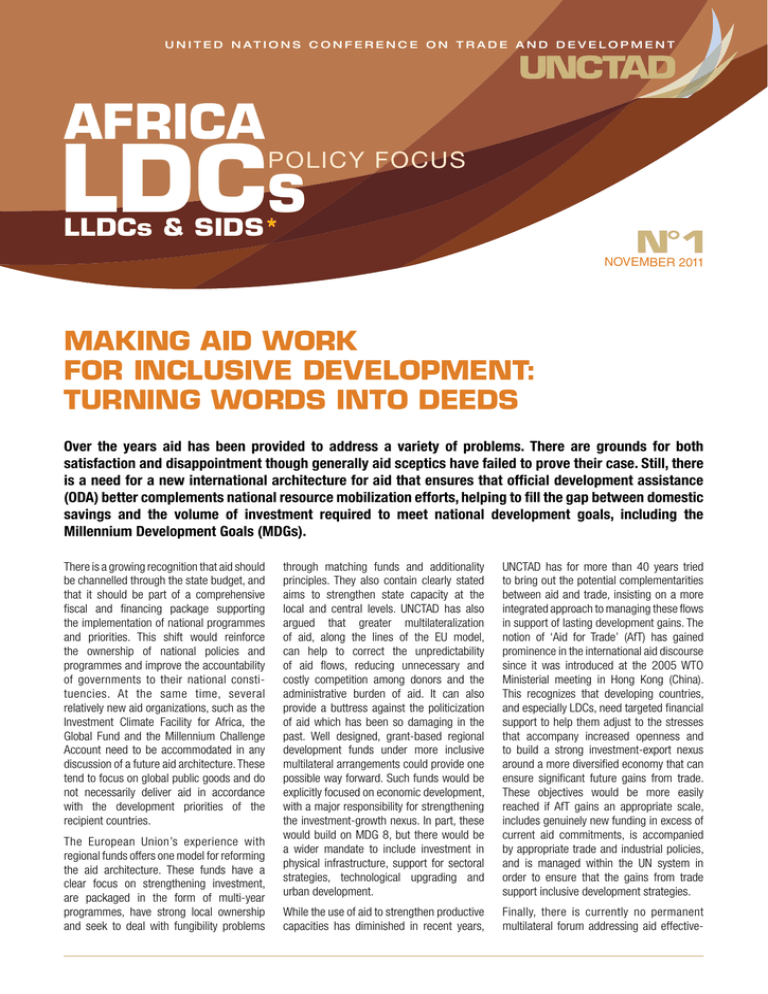
U n i t e d N at i o n s C o n f e r e n c e o n T r a d e A n d D e v e l o p m e n t Africa LDCs Policy focus LLDCs & SIDs* N°1 NOVEMBER 2011 Making Aid Work for Inclusive Development: Turning Words into Deeds Over the years aid has been provided to address a variety of problems. There are grounds for both satisfaction and disappointment though generally aid sceptics have failed to prove their case. Still, there is a need for a new international architecture for aid that ensures that official development assistance (ODA) better complements national resource mobilization efforts, helping to fill the gap between domestic savings and the volume of investment required to meet national development goals, including the Millennium Development Goals (MDGs). There is a growing recognition that aid should be channelled through the state budget, and that it should be part of a comprehensive fiscal and financing package supporting the implementation of national programmes and priorities. This shift would reinforce the ownership of national policies and programmes and improve the accountability of governments to their national constituencies. At the same time, several relatively new aid organizations, such as the Investment Climate Facility for Africa, the Global Fund and the Millennium Challenge Account need to be accommodated in any discussion of a future aid architecture. These tend to focus on global public goods and do not necessarily deliver aid in accordance with the development priorities of the recipient countries. The European Union’s experience with regional funds offers one model for reforming the aid architecture. These funds have a clear focus on strengthening investment, are packaged in the form of multi-year programmes, have strong local ownership and seek to deal with fungibility problems through matching funds and additionality principles. They also contain clearly stated aims to strengthen state capacity at the local and central levels. UNCTAD has also argued that greater multilateralization of aid, along the lines of the EU model, can help to correct the unpredictability of aid flows, reducing unnecessary and costly competition among donors and the administrative burden of aid. It can also provide a buttress against the politicization of aid which has been so damaging in the past. Well designed, grant-based regional development funds under more inclusive multilateral arrangements could provide one possible way forward. Such funds would be explicitly focused on economic development, with a major responsibility for strengthening the investment-growth nexus. In part, these would build on MDG 8, but there would be a wider mandate to include investment in physical infrastructure, support for sectoral strategies, technological upgrading and urban development. UNCTAD has for more than 40 years tried to bring out the potential complementarities between aid and trade, insisting on a more integrated approach to managing these flows in support of lasting development gains. The notion of ‘Aid for Trade’ (AfT) has gained prominence in the international aid discourse since it was introduced at the 2005 WTO Ministerial meeting in Hong Kong (China). This recognizes that developing countries, and especially LDCs, need targeted financial support to help them adjust to the stresses that accompany increased openness and to build a strong investment-export nexus around a more diversified economy that can ensure significant future gains from trade. These objectives would be more easily reached if AfT gains an appropriate scale, includes genuinely new funding in excess of current aid commitments, is accompanied by appropriate trade and industrial policies, and is managed within the UN system in order to ensure that the gains from trade support inclusive development strategies. While the use of aid to strengthen productive capacities has diminished in recent years, Finally, there is currently no permanent multilateral forum addressing aid effective- Key Areas for Action From UNCTAD’s perspective, the key areas where urgent action is needed to enhance the development effectiveness of aid in Africa and LDCs are as follows. The focus of the policy process should be on development effectiveness The Paris Process is welcome as it has entailed a shift away from a one-eyed approach to aid which attributed its effectiveness to recipient country policies. With the Paris Declaration, a more balanced approach has emerged in which aid effectiveness is attributed to the nature of the practices of both donors and recipients. However, this has led at the same time to a narrow focus on the effectiveness of aid delivery and the relationships between donors and recipients. There is a need now to focus more on development outcomes. Rebalancing the composition of aid, with a greater share to building productive capacities, is the key to development effectiveness Whilst there is an emerging consensus on the need to focus on development effectiveness, what this means in practice is unclear. For UNCTAD, and in the specific context of LDCs and Africa, it means focusing on the major development challenges facing these countries. These are diverse but it is clear that developing productive capacities and promoting structural transformation is the key to achieving substantial poverty reduction and a more inclusive and sustainable development path. This implies that there is a need to rebalance the composition of aid towards infrastructure and production sectors, including agriculture, industry and services, as well as facilitating the emergence of more developmentallyeffective states. Aid cannot work without country ownership Aid will not work without enhanced country ownership of national development strategies. However ensuring that the high levels of aid dependence do not result in donor domination is a very complex trick for both aid donors and aid recipients. UNCTAD work suggests that despite progress and commitment, country ownership has been undermined at policy formulation and implementation stages. LDC and African governments need to exercise more developmental leadership. But donors also have a role to play to ensure local ownership of the aid process and outcomes. For example, they should eliminate policy conditions attached to aid and also make more use of country systems in delivery. They should also increase the predictability of aid and create an environment that permits recipient countries to be more accountable to local stakeholders (parliaments, civil society and the private sector) than to the donors. Aid should also be used to build developmental state capacities in key parts of the government dealing with production sectors and trade, and should support the enhancement of local research capacity at national and regional levels. However, UNCTAD argues that the introduction of the aid management policies at the recipient country level by recipients is a potent method for enhancing ownership through instituting both an information system and monitoring tool. It should also provide a bottom-up mechanism through which recipient countries can themselves coordinate North-South aid and South-South official finance to meet their development objectives. Development partners should fulfil existing aid commitments Despite the recent increase in aid since the launch of the MDGs and the 2005 G8 Summit in Gleneagles, donors are yet to fulfil existing aid commitments to Africa. Similarly donors commitment to provide special international support for LDCs, through such mechanisms as the EIF and the LDC Climate Fund have not successfully mobilized much additional finance, and de facto tying of aid to LDCs still persists with de jure untying. Donors should use the forthcoming Busan meeting as an opportunity to increase efforts to meet their commitments. There is a need for a well-defined strategy to exit aid dependence African countries and LDCs will continue to need aid to finance development in the short to medium term. However, there is the need for African and LDC governments to adopt coherent strategies for exiting aid dependence in the medium to long term. Strengthening domestic resource mobilisation is critical to achieving this objective. This requires sustained economic growth, broadening the tax base, improving tax and customs administration, better mobilization and management of resource rents, reducing capital flight, and maintaining political stability. Donors should commit to using aid to support this process. Improve the international development architecture for Africa and LDCs For LDCs, UNCTAD has proposed that improving the quantity and quality of aid should be undertaken as part of a new international development architecture for LDCs (NIDA). This argument also applies to Africa. NIDA is essentially a matter of enhancing synergy between different forms of development finance and also between finance, trade and technology transfer/ acquisition. Policy coherence is a sine qua non to ensure that what is given with one hand is not taken away with the other hand. But the objective should be to go further and develop synergies in which there is overall development finance effectiveness (in which effective aid contributes to lever domestic resource mobilization and private capital flows) and also positive developmental feedback effects between external finance, international trade and the transfer and acquisition of technology. * This policy focus series covers all countries in Africa, the Least Developed Countries (LDCs), Landlocked Developing Countries (LLDCs), Small Island Developing States (SIDS), as well as Structurally Weak and Vulnerable Small Economies. This series is produced by UNCTAD’s Africa, LDCs and Special Programmes Division (ALDC). a l d c @ u n c t a d . o r g – w w w . u n c t a d . o r g unctad/ALDC/AFRICA/PF/2011/1 ness from the perspective of the recipients. The OECD DAC is an important venue for these debates, but it focuses largely on donor issues. Although the ECOSOC Development Cooperation Forum (DCF) provides a platform for multi-stakeholder dialogue on international development cooperation, it has not yet given Africa and LDCs adequate voice. Given these concerns, there is the need to either strengthen the DCF or explore alternative ways to combine the experience of different international agencies and the wider development community, working on the consensus-building principle, and offering an open forum for frank, wellinformed and constructive debate on aid and development issues.
